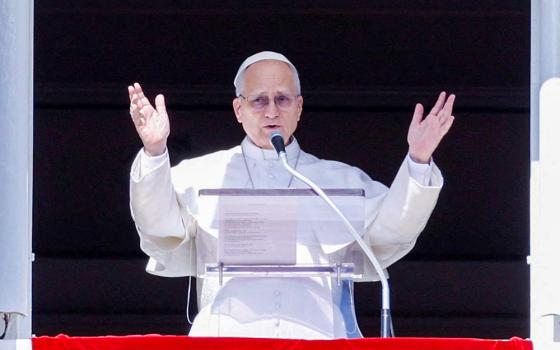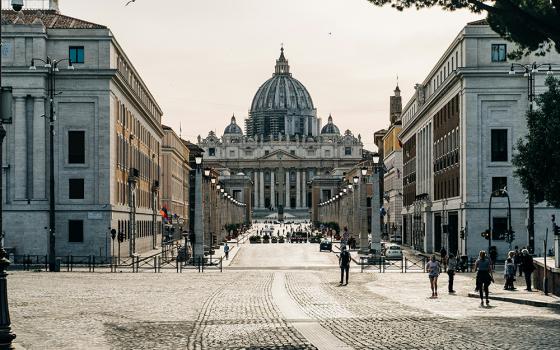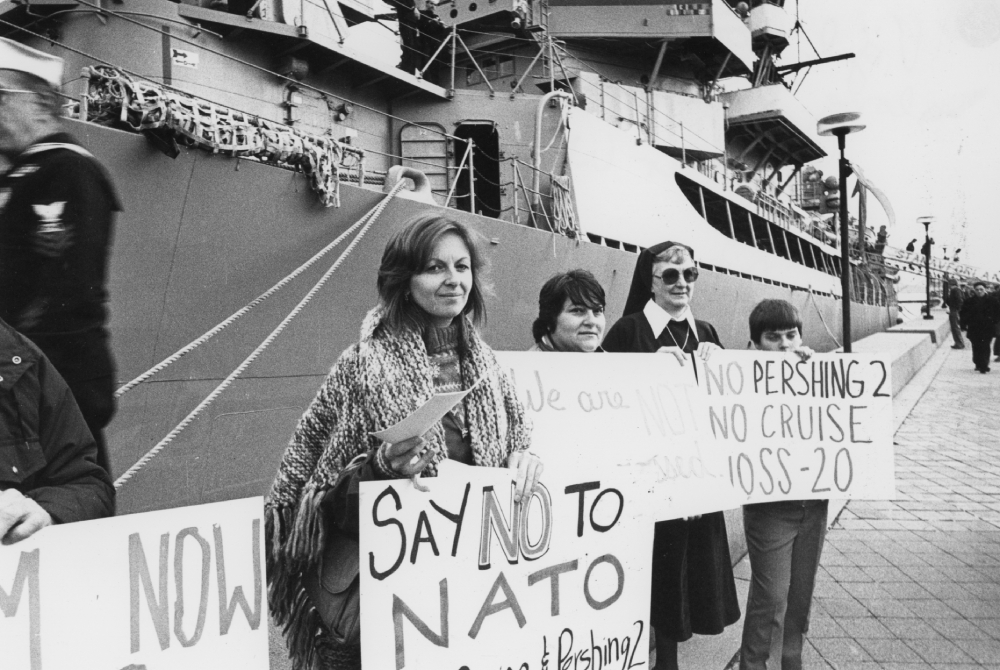
A sister in habit is seen among those holding a vigil against nuclear weapons on the pier alongside the guided-missile destroyer USS Dewey on Nov. 11, 1983. (NCR photo/Peter Wingert)
For those active in nuclear disarmament work, the 80th anniversary of the atomic bombings of Hiroshima and Nagasaki (Aug. 6 and 9, 1945, respectively) is a reminder of how much work is left to be done before the world is free of the nuclear menace.
Despite at least one success — like the 2017 Treaty on the Prohibition of Nuclear Weapons, or TPNW, which had strong Vatican support — efforts to abolish nuclear weapons have not yet succeeded, despite the continued existential threat the weapons pose.
"Nuclear weapons can never be used, for such use would ultimately trigger the end of us all. So why do we have them?" said Mary T. Yelenick, main representative of Pax Christi International at the United Nations. "And why do we spend such an obscene portion of our national resources to 'modernize' them, when the effect of such modernization simply enhances the prospects of our own demise?"
Catholic sisters involved in such advocacy work — many of them now in their 70s and 80s, and with many of their peers who were active in anti-nuclear movements 40 or more years ago now gone — note that the continued threat of nuclear war has not penetrated public consciousness.
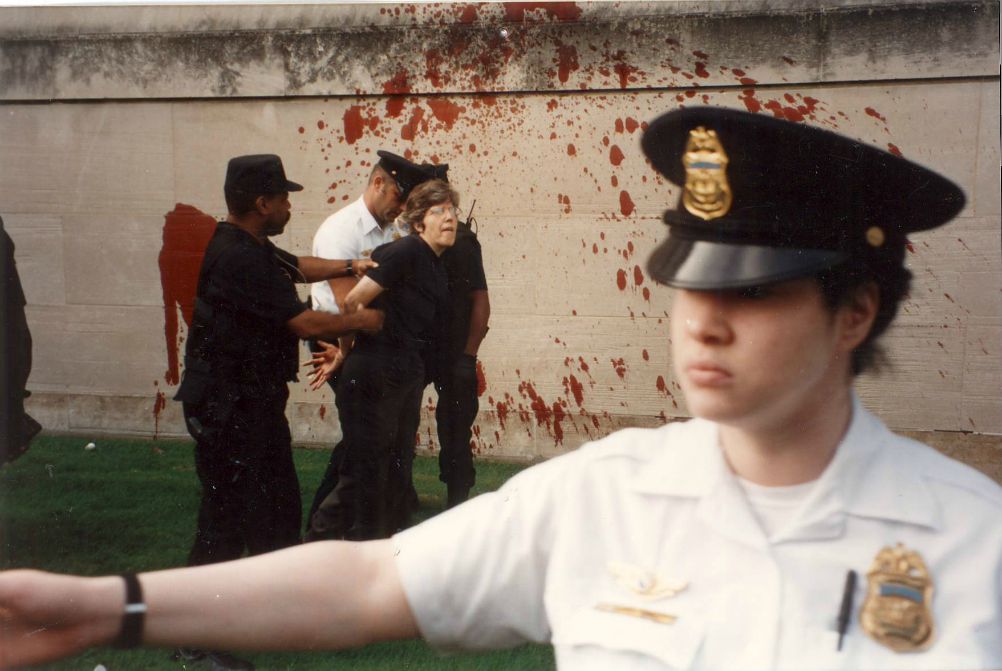
Sr. Carol Gilbert is arrested outside the Pentagon in Washington, D.C., during a protest in the mid-1990s. (Dominican Sisters Archives Collection)
Sr. Carol Gilbert, one of the most prominent anti-nuclear activists among U.S. Catholic sisters, is optimistic that long-term activism can be revived, noting that the International Campaign to Abolish Nuclear Weapons, or ICAN, won the Nobel Prize for Peace in 2017. That and the fact that 94 countries have signed the TPNW are worthy victories, Gilbert said.
Still, "we don't have a national peace movement as it relates to nuclear weapons and nuclear arms in this country," she acknowledged, adding the issue is not engaging to society at large. Also frustrating, Gilbert said, is that the U.S., Russia and China, have not approved the TPNW.
"It just went off people's radar," Gilbert said of the overall political and cultural climate. "There are certainly groups that are out there, but we don't have what we did in the 1980s."
"Truly national conversations about critical subjects are rare," said Mary T. Yelenick of Pax Christi.
A major dynamic and challenge for activists is a fractured media environment that is far different than it was four decades ago, when Cold War fears fueled popular calls for a nuclear freeze. (An estimated 1 million people, for example, attended a nuclear freeze rally in New York City's Central Park in 1982.)
"It's difficult for people now not to feel overwhelmed about so many issues," said Loretto Sr. Pat McCormick, a longtime peace activist.
Still, McCormick, Gilbert and others say that the issue is not going away and that a popular movement, especially among young people, is still possible.
As one small example of interest among young people, students from several U.S. Catholic universities plan pilgrimages to Hiroshima and Nagasaki to commemorate the events of 1945, with several cardinals and archbishops accompanying the students, said Sr. Shizue Hirota, a Mercedarian Missionaries of Berriz sister based in Tokyo.
With the Hiroshima and Nagasaki anniversaries approaching this week, Global Sisters Report spoke with six individuals who have been involved in some way with anti-nuclear activism, including four Catholic sisters, to reflect on the bombings eight decades ago and where the world stands in their wake.
In Japan, a need to remember
August is always a time for Japanese to focus on issues of peace, justice and the abolition of nuclear weapons, said Sr. Shizue Hirota, whose various ministries include serving as Japan coordinator for Talitha Kum, the global sisters' anti-trafficking alliance.
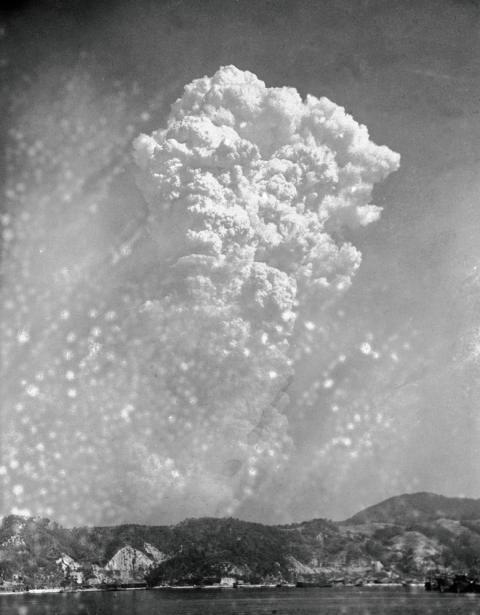
Smoke rises around 20,000 feet above Hiroshima, Japan, after the first atomic bomb was dropped, Aug. 6, 1945. The Nobel Peace Prize has been awarded to Nihon Hidankyo, a Japanese organization of survivors of the U.S. atomic bombings of Hiroshima and Nagasaki, for its activism against nuclear weapons. (AP Photo, File)
"We need to remember Hiroshima and Nagasaki as we continue our commitment to a world without nuclear weapons, by listening to the 'Hibakushas' [the survivors of the bombings], who are becoming fewer in number and making conscious efforts to make the events of 1945 come alive, especially among the younger generations."
At the same time, she said, Japanese people need "to be conscious of the whole history of the Second World War, in which Japan's Imperial Armed Forces massacred 20 million people in the countries of Asia and the Pacific. We are both aggressors and victims, and need to ask for forgiveness and be forgiven."
Closer to catastrophe?
Sr. Kathleen Kanet, a Religious of the Sacred Heart of Mary and a long-time New York peace activist, is worried a continued commitment to "the development and production of more and 'better' nuclear weapons fantastically leaves us, the whole world, in more danger of catastrophe than when we dared use them on the Japanese people in 1945."
She said the Trump administration is seeking hefty increases for the National Nuclear Security Administration's budget with "the intent to modernize the nation's nuclear arsenal and 'protect the American people.' It is said that the weapons budget supports 'a safe, secure, reliable and effective' stockpile. But we know this will only bring us closer to catastrophe whether accidentally or intentionally."
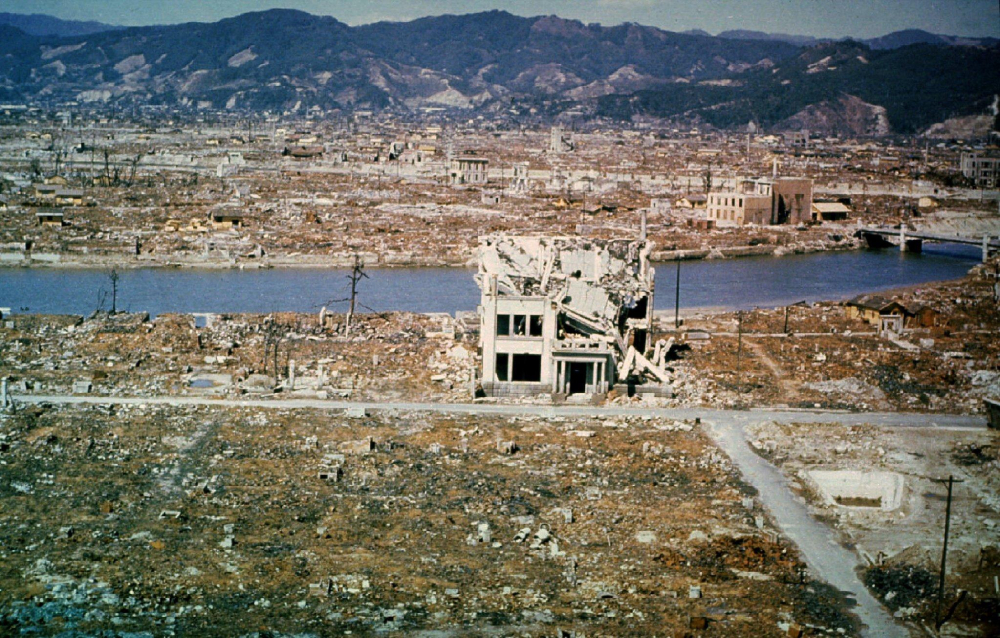
This is a general view of Hiroshima, Japan, six months after the U.S. dropped an atomic bob on the city Aug. 6, 1945. (CNS/Reuters)
Kanet acknowledges that many sisters in the United States have dedicated their ministries "to end war, to advocate for the elimination of nuclear weapons, to educate for peace and justice," yet often "do not feel the success of this commitment." Despite that, she hopes to continue to find ways herself "to be a prophet, to speak out and to join with others where I live, especially with my neighbors, my community, my parish and all where I create community."
A push for new treaties
Fr. John Pawlikowski, professor emeritus of social ethics at Catholic Theological Union in Chicago, believes "the human family needs to come to a deeper understanding of its responsibility of caring for our common home."
"One area that calls out for our attention as we commemorate another anniversary of Hiroshima and Nagasaki is pushing for new international treaties restricting and removing our storehouse globally of nuclear weaponry," said Pawlikowski, a Servite priest.
Advertisement
"We live currently in a situation in which previous such treaties have expired and not renewed." That poses a threat, he said, to the continued existence of creation.
Climate change and the global nuclear arsenal, he said, "are the greatest threats facing humanity today," and Pawlikowski hopes that "efforts linking the dangers of both may be making inroads with younger activists who up until now have been more concerned with environmental challenges."
A fractured media environment
Mary T. Yelenick of Pax Christi believes while it is more important than ever "that our nation focus attention on nuclear weapons, it also somehow feels more difficult now than it did even several decades ago to have a national conversation about any single topic — even one as critical as the horrors of nuclear weapons."
That is in part due "to the increased fragmentation and polarization of media sources," she said.
"While in 1983 it was possible to broadcast on national television a terrifying film — 'The Day After' — about the consequences of nuclear weapons, which triggered a national conversation among concerned citizens, today there are thousands of disparate media sources targeting disparate and unconnected audiences.

In 1980, representatives from eight religious orders stop McDonnell Douglas Corporation employees on their way to work in St. Louis, asking for workers' proxies to back the religious orders' request that McDonnell Douglas convert from military to peacetime production. (NCR photo/Mark Neilsen)
"Truly national conversations about critical subjects are rare."
As a consequence, Yelenick said, "there persists woefully little public awareness or discussion about the fact that great swaths of the earth" have been affected by nuclear fallout. "This is not only in Japan, where the U.S. atomic bombs were dropped, and the South Pacific, the site of so much U.S. atomic testing and contamination, but also in our country itself, particularly on southwestern Native land and people. They were, and remain, generationally, poisoned."
Weapons that are not deterrents
Dominican Sr. Carol Gilbert, the long-time anti-nuclear activist, estimates she has been "in and out of jails and prisons for the last 40 years resisting war and nuclear weapons" — often done alongside the late Dominican Sr. Ardeth Platte. Gilbert's longest incarceration was for 2.5 years.
"My big disappointment really is that, after 80 years, we have not learned that nuclear weapons are not a deterrent," said Dominican Sr. Carol Gilbert.
Now she lobbies Congress. While there are some calls in Congress for a renewal of nuclear arms control, there seems to be little support for the outright abolition of nuclear weapons, which Gilbert and others see as the ultimate goal.
"We need to call for the absolute abolition of nuclear weapons today. It should have been yesterday," Gilbert said. "And it's not done."
"My big disappointment really is that, after 80 years, we have not learned that nuclear weapons are not a deterrent. And, of course, until the major nuclear weapons countries, China, the United States and Russia, decide that they are going to stop using nuclear weapons, other countries are going to want them. And why wouldn't they want them?"
Sometimes Gilbert hears worries from others that the only way to galvanize people will be some kind of nuclear-related accident. Her response to that is, "Do we want to wait until we actually use one of these things? I hate to think there has to be an accident before we're going to wake up."
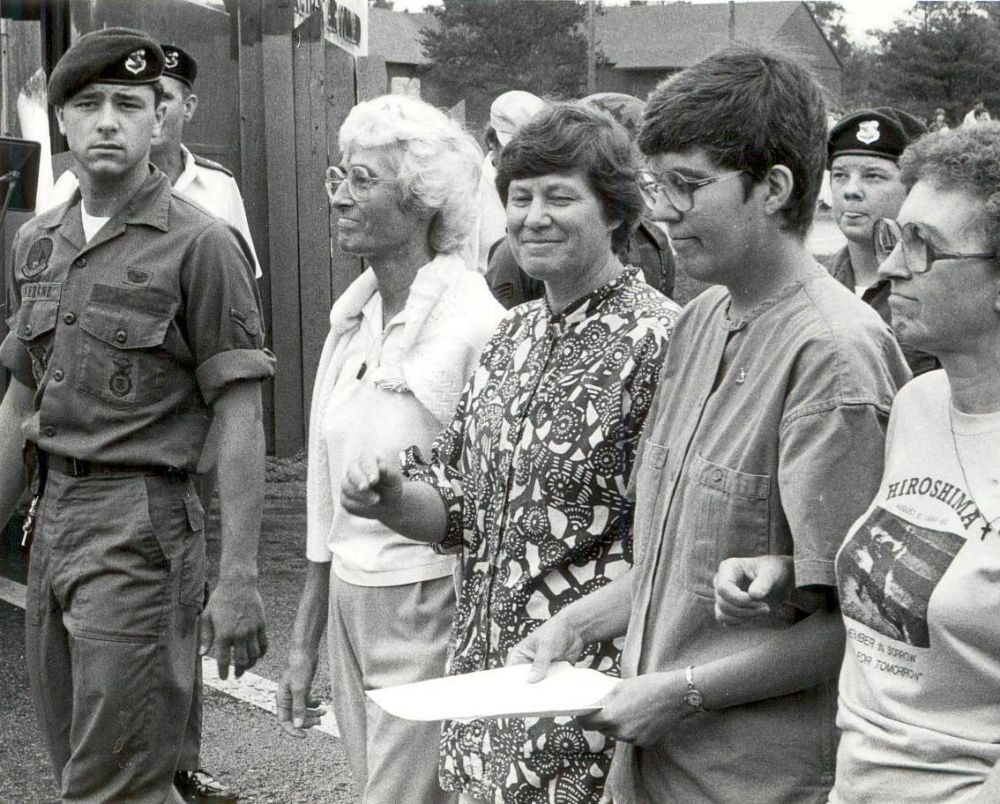
From left, Dominican Srs. Jean Reimer, Ardeth Platte, Carol Gilbert and Jackie Hudson protest outside Michigan Strategic Air Base in the early 1990s. (Dominican Sisters Archives Collection)
Young people give her hope, Gilbert said, "because they haven't given up on the world. They haven't given up on these things."
"The whole thing was immoral"
Loretto Sr. Pat McCormick is also no stranger to activism, having been part of an interfaith group of prayer and resistance protesting at the Rocky Flats nuclear weapons plant outside of Denver starting in 1980. Rocky Flats manufactured plutonium triggers for nuclear warheads. The protests at the plant continued until 1992, when the plant closed over environmental concerns.
McCormick continued to join the interfaith group's rallies for peace and human rights at the state capitol in Denver until she left Colorado in 2023 to live at her congregation's motherhouse in Nerinx, Kentucky.
She credits contact with Fr. Daniel Berigan as an early influence.
The 2022 full-scale invasion by Russia of Ukraine — with Russia occasionally issuing threats about the use of nuclear weapons — has shed a limited spotlight on the nuclear issue again, McCormick said. But overall, the global nuclear threat is not at the top of many agendas. "I'm very concerned that, in the U.S., we're in denial that these weapons won't ever be used."
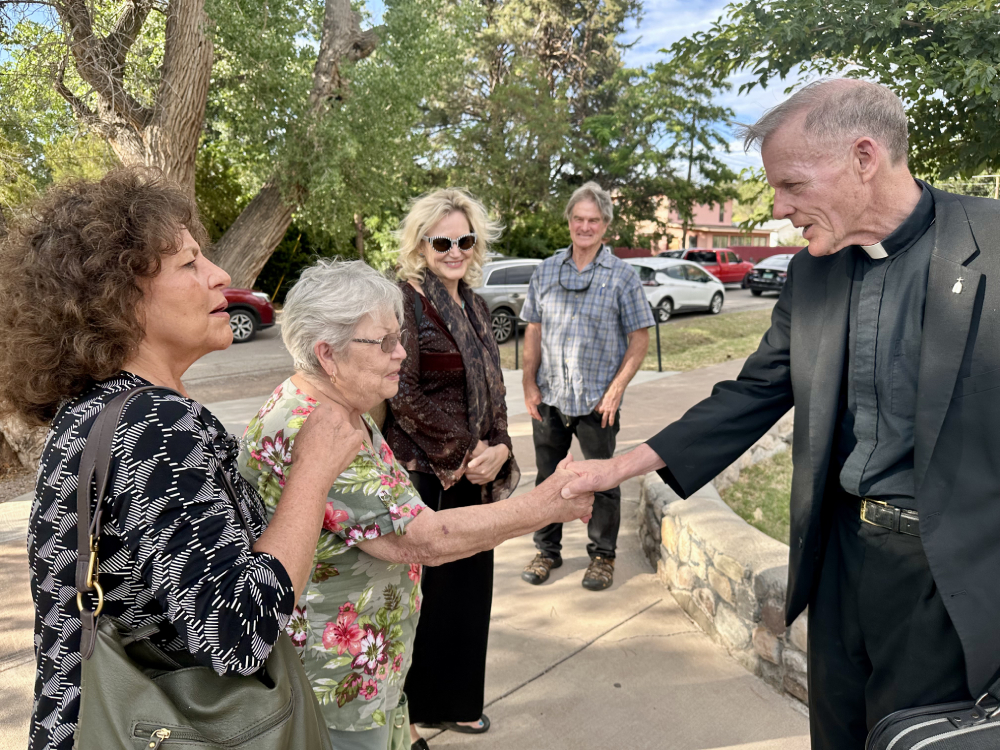
Archbishop Wester shaking hand of Rosalie Cordova, following a mass on July 16 2025, with Tina Cordova, Melissa Parke and Jay Coghlan looking on. (Courtesy of ICAN/Seth Shelden)
Like a number of other sisters, McCormick feels the U.S. Catholic hierarchy has generally failed Catholics on the issue, as well as on peace concerns in general. However, there are notable exceptions, like Archbishop John C. Wester of Santa Fe, New Mexico, who recently joined ICAN in commemorating the 80th anniversary of the testing of the first atomic bomb in New Mexico.
McCormick also praised the late Pope Francis for his strong support of nuclear weapons abolition, and similarly lauded Pope Leo XIV for his commitment to peace and justice concerns. "I have total confidence in him," she said of the new pontiff.
As for the 80th anniversary of the Hiroshima and Nagasaki bombings, McCormick believes the violence waged on two Japanese cities violated the accepted rules of war, particularly that civilians should not be military targets. "The whole thing," she said, "was immoral."





